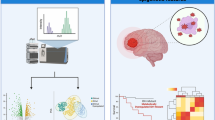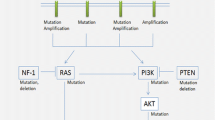Abstract
Malignant gliomas represent one of the most aggressive forms of cancer, displaying high mortality rates and limited treatment options. Specific subpopulations of cells residing in the tumor niche with stem-like characteristics have been postulated to initiate and maintain neoplasticity while resisting conventional therapies. The study presented here aims to define the role of glycogen synthase kinase 3 beta (GSK3b) in patient-derived glioblastoma (GBM) stem-like cell (GSC) proliferation, apoptosis and invasion. To evaluate the potential role of GSK3b in GBM, protein profiles from 68 GBM patients and 20 normal brain samples were analyzed for EGFR-mediated PI3kinase/Akt and GSK3b signaling molecules including protein phosphatase 2A (PP2A). To better understand the function of GSK3b in GBM, GSCs were isolated from GBM patient samples. Blocking GSK3b phosphorylation at Serine 9 attenuated cell proliferation while concomitantly stimulating apoptosis through activation of Caspase-3 in patient-derived GSCs. Increasing GSK3b protein content resulted in the inhibition of cell proliferation, colony formation and stimulated programmed cell death. Depleting GSK3b in GSCs down regulated PP2A. Furthermore, knocking down PP2A or blocking its activity by okadaic acid inactivated GSK3b by increasing GSK3b phosphorylation at Serine 9. Our data suggests that GSK3b may function as a regulator of apoptosis and tumorigenesis in GSCs. Therapeutic approaches targeting GSK3b in glioblastoma stem-like cells may be a useful addition to our current therapeutic armamentarium.





Similar content being viewed by others
References
Bleau AM, Howard BM, Taylor LA, Gursel D, Greenfield JP, Lim Tung HY, Holland EC, Boockvar JA (2008) New strategy for the analysis of phenotypic marker antigens in brain tumor-derived neurospheres in mice and humans. Neurosurg Focus 24:E28. doi:10.3171/FOC/2008/24/3-4/E27
Pollard SM, Yoshikawa K, Clarke ID, Danovi D, Stricker S, Russell R, Bayani J, Head R, Lee M, Bernstein M, Squire JA, Smith A, Dirks P (2009) Glioma stem cell lines expanded in adherent culture have tumor-specific phenotypes and are suitable for chemical and genetic screens. Cell Stem Cell 4:568–580. doi:10.1016/j.stem.2009.03.014
Sanai N, Alvarez-Buylla A, Berger MS (2005) Neural stem cells and the origin of gliomas. N Engl J Med 353:811–822. doi:10.1056/NEJMra043666
Wang JC (2007) Evaluating therapeutic efficacy against cancer stem cells: new challenges posed by a new paradigm. Cell Stem Cell 1:497–501
Gursel DB, Shin BJ, Burkhardt JK, Kesavabhotla K, Schlaff CD, Boockvar JA (2011) Glioblastoma stem-like cells-biology and therapeutic implications. Cancers 3:2655–2666. doi:10.3390/cancers3022655
Embi N, Rylatt DB, Cohen P (1980) Glycogen synthase kinase-3 from rabbit skeletal muscle. Separation from cyclic-AMP-dependent protein kinase and phosphorylase kinase. Eur J biochem/FEBS 107:519–527
Ring DB, Johnson KW, Henriksen EJ, Nuss JM, Goff D, Kinnick TR, Ma ST, Reeder JW, Samuels I, Slabiak T, Wagman AS, Hammond ME, Harrison SD (2003) Selective glycogen synthase kinase 3 inhibitors potentiate insulin activation of glucose transport and utilization in vitro and in vivo. Diabetes 52:588–595
Ougolkov AV, Fernandez-Zapico ME, Bilim VN, Smyrk TC, Chari ST, Billadeau DD (2006) Aberrant nuclear accumulation of glycogen synthase kinase-3beta in human pancreatic cancer: association with kinase activity and tumor dedifferentiation. Clinical cancer research : an official journal of the American Association for Cancer Research 12:5074–5081. doi:10.1158/1078-0432.CCR-06-0196
Ougolkov AV, Billadeau DD (2006) Targeting GSK-3: a promising approach for cancer therapy? Future Oncol 2:91–100. doi:10.2217/14796694.2.1.91
Kang T, Wei Y, Honaker Y, Yamaguchi H, Appella E, Hung MC, Piwnica-Worms H (2008) GSK-3 beta targets Cdc25A for ubiquitin-mediated proteolysis, and GSK-3 beta inactivation correlates with Cdc25A overproduction in human cancers. Cancer Cell 13:36–47. doi:10.1016/j.ccr.2007.12.002
Ding Q, Xia W, Liu JC, Yang JY, Lee DF, Xia J, Bartholomeusz G, Li Y, Pan Y, Li Z, Bargou RC, Qin J, Lai CC, Tsai FJ, Tsai CH, Hung MC (2005) Erk associates with and primes GSK-3beta for its inactivation resulting in upregulation of beta-catenin. Mol Cell 19:159–170. doi:10.1016/j.molcel.2005.06.009
Shi CS, Huang NN, Harrison K, Han SB, Kehrl JH (2006) The mitogen-activated protein kinase kinase kinase kinase GCKR positively regulates canonical and noncanonical Wnt signaling in B lymphocytes. Mol Cell Biol 26:6511–6521. doi:10.1128/MCB.00209-06
Lenferink AE, Busse D, Flanagan WM, Yakes FM, Arteaga CL (2001) ErbB2/neu kinase modulates cellular p27(Kip1) and cyclin D1 through multiple signaling pathways. Cancer Res 61:6583–6591
Ougolkov AV, Fernandez-Zapico ME, Savoy DN, Urrutia RA, Billadeau DD (2005) Glycogen synthase kinase-3beta participates in nuclear factor kappaB-mediated gene transcription and cell survival in pancreatic cancer cells. Cancer Res 65:2076–2081. doi:10.1158/0008-5472.CAN-04-3642
Tan J, Zhuang L, Leong HS, Iyer NG, Liu ET, Yu Q (2005) Pharmacologic modulation of glycogen synthase kinase-3beta promotes p53-dependent apoptosis through a direct Bax-mediated mitochondrial pathway in colorectal cancer cells. Cancer Res 65:9012–9020. doi:10.1158/0008-5472.CAN-05-1226
Korur S, Huber RM, Sivasankaran B, Petrich M, Morin P Jr, Hemmings BA, Merlo A, Lino MM (2009) GSK3beta regulates differentiation and growth arrest in glioblastoma. PLoS One 4:e7443. doi:10.1371/journal.pone.0007443
Li Y, Lu HM, Li G, Yan GM (2010) Glycogen synthase kinase-3beta regulates astrocytic differentiation of U87-MG human glioblastoma cells. Acta Pharmacol Sin 31:355–360. doi:10.1038/aps.2010.10
Lin CF, Chen CL, Chiang CW, Jan MS, Huang WC, Lin YS (2007) GSK-3beta acts downstream of PP2A and the PI 3-kinase-Akt pathway, and upstream of caspase-2 in ceramide-induced mitochondrial apoptosis. J Cell Sci 120:2935–2943. doi:10.1242/jcs.03473
Cohen P, Frame S (2001) The renaissance of GSK3. Nat Rev Mol Cell Biol 2:769–776. doi:10.1038/35096075
Gursel DB, Beyene RT, Hofstetter C, Greenfield JP, Souweidane MM, Kaplitt M, Arango-Lievano M, Howard B, Boockvar JA (2011) Optimization of glioblastoma multiforme stem cell isolation, transfection, and transduction. J Neurooncol 104:509–522. doi:10.1007/s11060-011-0528-2
Ekstrand AJ, James CD, Cavenee WK, Seliger B, Pettersson RF, Collins VP (1991) Genes for epidermal growth factor receptor, transforming growth factor alpha, and epidermal growth factor and their expression in human gliomas in vivo. Cancer Res 51:2164–2172
Chakravarti A, Zhai G, Suzuki Y, Sarkesh S, Black PM, Muzikansky A, Loeffler JS (2004) The prognostic significance of phosphatidylinositol 3-kinase pathway activation in human gliomas. Journal of clinical oncology : official journal of the American Society of Clinical Oncology 22:1926–1933. doi:10.1200/JCO.2004.07.193
Sathornsumetee S, Reardon DA, Desjardins A, Quinn JA, Vredenburgh JJ, Rich JN (2007) Molecularly targeted therapy for malignant glioma. Cancer 110:13–24. doi:10.1002/cncr.22741
Miyashita K, Kawakami K, Nakada M, Mai W, Shakoori A, Fujisawa H, Hayashi Y, Hamada J, Minamoto T (2009) Potential therapeutic effect of glycogen synthase kinase 3beta inhibition against human glioblastoma. Clinical cancer research : an official journal of the American Association for Cancer Research 15:887–897. doi:10.1158/1078-0432.CCR-08-0760
Cross DA, Alessi DR, Cohen P, Andjelkovich M, Hemmings BA (1995) Inhibition of glycogen synthase kinase-3 by insulin mediated by protein kinase B. Nature 378:785–789. doi:10.1038/378785a0
Cross DA, Alessi DR, Vandenheede JR, McDowell HE, Hundal HS, Cohen P (1994) The inhibition of glycogen synthase kinase-3 by insulin or insulin-like growth factor 1 in the rat skeletal muscle cell line L6 is blocked by wortmannin, but not by rapamycin: evidence that wortmannin blocks activation of the mitogen-activated protein kinase pathway in L6 cells between Ras and Raf. Biochem J 303(Pt 1):21–26
Hurel SJ, Rochford JJ, Borthwick AC, Wells AM, Vandenheede JR, Turnbull DM, Yeaman SJ (1996) Insulin action in cultured human myoblasts: contribution of different signalling pathways to regulation of glycogen synthesis. Biochem J 320(Pt 3):871–877
Saito Y, Vandenheede JR, Cohen P (1994) The mechanism by which epidermal growth factor inhibits glycogen synthase kinase 3 in A431 cells. Biochem J 303(Pt 1):27–31
Pap M, Cooper GM (1998) Role of glycogen synthase kinase-3 in the phosphatidylinositol 3-Kinase/Akt cell survival pathway. J Biol Chem 273:19929–19932
Song L, De Sarno P, Jope RS (2002) Central role of glycogen synthase kinase-3beta in endoplasmic reticulum stress-induced caspase-3 activation. J Biol Chem 277:44701–44708. doi:10.1074/jbc.M206047200
Stegh AH, Kim H, Bachoo RM, Forloney KL, Zhang J, Schulze H, Park K, Hannon GJ, Yuan J, Louis DN, DePinho RA, Chin L (2007) Bcl2L12 inhibits post-mitochondrial apoptosis signaling in glioblastoma. Genes Dev 21:98–111. doi:10.1101/gad.1480007
Stegh AH, Kesari S, Mahoney JE, Jenq HT, Forloney KL, Protopopov A, Louis DN, Chin L, DePinho RA (2008) Bcl2L12-mediated inhibition of effector caspase-3 and caspase-7 via distinct mechanisms in glioblastoma. Proc Natl Acad Sci USA 105:10703–10708. doi:10.1073/pnas.0712034105
Stegh AH, Chin L, Louis DN, DePinho RA (2008) What drives intense apoptosis resistance and propensity for necrosis in glioblastoma? A role for Bcl2L12 as a multifunctional cell death regulator. Cell Cycle 7:2833–2839
Chou CH, Chou AK, Lin CC, Chen WJ, Wei CC, Yang MC, Hsu CM, Lung FW, Loh JK, Howng SL, Hong YR (2012) GSK3beta regulates Bcl2L12 and Bcl2L12A anti-apoptosis signaling in glioblastoma and is inhibited by LiCl. Cell Cycle 11:532–542. doi:10.4161/cc.11.3.19051
Pap M, Cooper GM (2002) Role of translation initiation factor 2B in control of cell survival by the phosphatidylinositol 3-kinase/Akt/glycogen synthase kinase 3beta signaling pathway. Mol Cell Biol 22:578–586
Bijur GN, De Sarno P, Jope RS (2000) Glycogen synthase kinase-3beta facilitates staurosporine- and heat shock-induced apoptosis. Protection by lithium. J Biol Chem 275:7583–7590
Hoeflich KP, Luo J, Rubie EA, Tsao MS, Jin O, Woodgett JR (2000) Requirement for glycogen synthase kinase-3beta in cell survival and NF-kappaB activation. Nature 406:86–90. doi:10.1038/35017574
Ma C, Wang J, Gao Y, Gao TW, Chen G, Bower KA, Odetallah M, Ding M, Ke Z, Luo J (2007) The role of glycogen synthase kinase 3beta in the transformation of epidermal cells. Cancer Res 67:7756–7764. doi:10.1158/0008-5472.CAN-06-4665
Schonthal AH (2001) Role of serine/threonine protein phosphatase 2A in cancer. Cancer Lett 170:1–13
Lu J, Kovach JS, Johnson F, Chiang J, Hodes R, Lonser R, Zhuang Z (2009) Inhibition of serine/threonine phosphatase PP2A enhances cancer chemotherapy by blocking DNA damage induced defense mechanisms. Proc Natl Acad Sci USA 106:11697–11702. doi:10.1073/pnas.0905930106
Hofstetter CP, Burkhardt JK, Shin BJ, Gursel DB, Mubita L, Gorrepati R, Brennan C, Holland EC, Boockvar JA (2012) Protein phosphatase 2A mediates dormancy of glioblastoma multiforme-derived tumor stem-like cells during hypoxia. PLoS One 7:e30059. doi:10.1371/journal.pone.0030059
Kuo YC, Huang KY, Yang CH, Yang YS, Lee WY, Chiang CW (2008) Regulation of phosphorylation of Thr-308 of Akt, cell proliferation, and survival by the B55alpha regulatory subunit targeting of the protein phosphatase 2A holoenzyme to Akt. J Biol Chem 283:1882–1892. doi:10.1074/jbc.M709585200
Acknowledgments
The authors would like to thank Maria Irina Chiriac for excellent technical assistance in preparing the figures of this manuscript.
Disclosure
The authors declare that they have no conflict of interest. The authors report no financial or material support concerning the materials or methods used in this study or the findings specified in this paper.
Author information
Authors and Affiliations
Corresponding author
Electronic supplementary material
Below is the link to the electronic supplementary material.
Rights and permissions
About this article
Cite this article
Gürsel, D.B., Banu, M.A., Berry, N. et al. Tight regulation between cell survival and programmed cell death in GBM stem-like cells by EGFR/GSK3b/PP2A signaling. J Neurooncol 121, 19–29 (2015). https://doi.org/10.1007/s11060-014-1602-3
Received:
Accepted:
Published:
Issue Date:
DOI: https://doi.org/10.1007/s11060-014-1602-3




